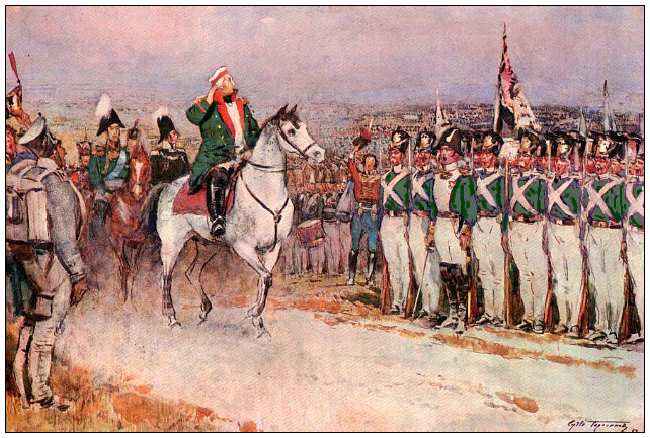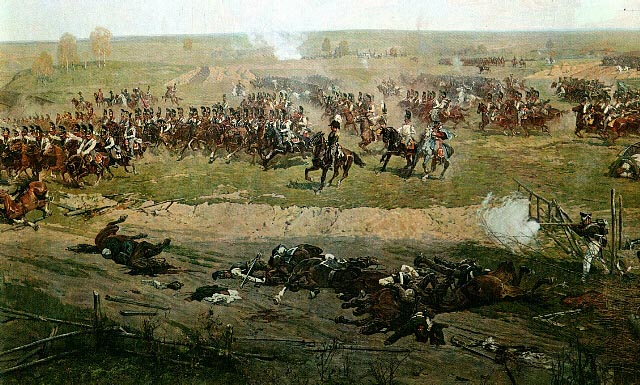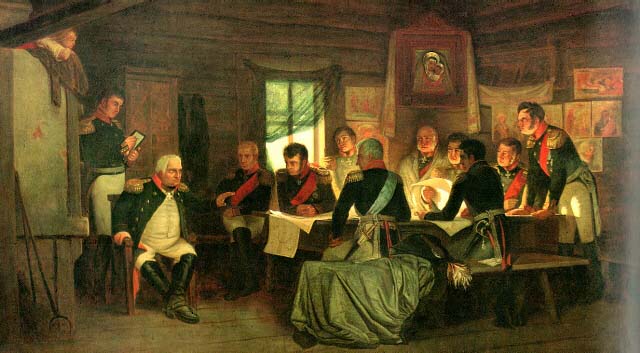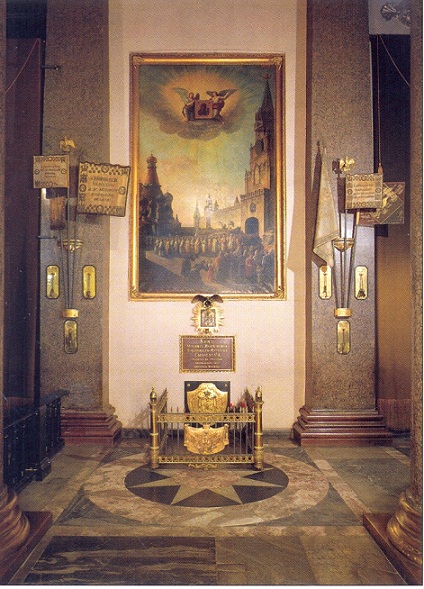Kutuzov
The Turkish Army 60 thousands in number approached to Rushuk and camped 8 kilometers from the fortress. On June, 22 the Turkish Cavalry attacked, broke through the Russian defence and rushed to Rushuk. Another mass of cavalry went to the Danube to attack the fortress from the other side. The garrison of Rushukcounter-attacked and threw back the Turks.
At the same time Kutuzov sent his Cavalry to attack the Turkish cavalry in the Russian rear, the Turks retreated and began to prepare the new attack. But Kutuzov opened the strong artillery fire and made the Turkish Cavalry to retreat to the main Vizier Army.
At 2 p.m. the Vizier saw the defeat of his Cavalry and retreated into his fortified camp between Pisanitsy and Kadikva villages. The Russian troops pursued the enemy till their camp. After that Kutuzov sent the Cavalry and it pursued the Turks for 10 versts more. For this victory Kutuzov was rewarded with a portrait of Alexander I.
But the Vizier didn't want to surrender so easily. He began to fortify his camp. But Kutuzov left Rushuk and withdrew his troops on the left bank of the Danube.
The Vizier realized this as his victory. For the "victory" he got a rich award from the Sultan.
But Kutuzov wanted the Vizier to relax his vigilance. He could entrap the Vizier and after surround his troops from the land and the river. And as a result, the Turks blocked up on the Danube left bank sustained terrible losses. And winter had come, many people in the Turkish Army died of cold, diseases and a lack of food. They even began to eat their horses. At last the Grand Vizier Army was made to surrender.
The Russian-Turkish war of 1810-1812 was finished by a peace treaty signed in Bucharest, at May,16 when it was the danger of Napolen's invasion into Russia. In according to this treaty Russia got Bessarabia and all the Transcaucasian regions stayed the part of the Russian Empire.
Emperor Alexander removed Kutuzov from the command and sent Admiral Chichagov to command the Moldavian Army. Kutuzov went to his estate Goroshki and was there till the beginning of the war of 1812.
Kutuzov was appointed the Commander-in-Chief of the Russian Army 10 days before the Borodino battle, in the end of August, 1812.
|
|
Before this appointment in August Kutuzov was a commander of the St.Peterburg Milita. He made the rules for training of militiamen that would become afterwards the base to the militiamen training in all Russian provinces.
The Borodino battle began at August, 26 (September,7 -new style) at 5 a.m. and lasted about 15 hours.
|
|
On August,27, at 2 a.m. the Russian Army left the field of the battle and in two columns retreated to Mozhaysk to Zhukovo village. The French vanguard was not able to seize Mozhaysk at once, and only at August,28 Napoleon entered into Mozhaysk. He was there for 3 days putting his troops in order.
Kutuzov's Headquarters was in Fili village. In the hut of peasant A.S.Frolov was made a War Council, all Russian generals were present at it. There was only one question: "Have we to wait the enemy on our positions and give battle or to surrender our capital without battle?"
|
|
Kutuzov had heard all proposals ans said what Russian would nor be lost after the surrender of Moscow and proposed to save the Army and don't give battle, to approach the coming reinforcements and "by surrendering Moscow prepare the death for the enemy". The Russian Army was ordered to retreat along the Ryazan road.
At September,2 after leaving Moscow the Russian Army stayed at Panki village. Next day it continued its retreat and went to the Old Kaluga road to approach the fresh troops coming to the aid.
On September,8 the Russian Army stopped near Krasnays Pakhra village and then after one more march camped in Tarutino village.
Kutuzov was occupied with reforming the army, providing food, arms, equipment and solving other problems.
|
|
The Russian Army got the necessary reinforcements and began to attack the French Army, that had left Moscow at that time.
With great losses Napoleon retreated slowly to the Berezina and there was the final death of the Grande Armee.
For Kutuzov the war against Napoleon was finished when Marshal Ney with his troops crossed the Neman and left the Russian territory. But for Alexander I it was only the beginning. It was the old, constant and hopeless disagreement between the Emperor and the old Field-Marshal.
Russia had already been saved, and was there a need to "save" Europe or it would be better to make peace with Napoleon and let European states fight for their freedom by themselves, and let the Great Britain fight for its industrial and trading superiority by itself too?
"Yes, we must save Europe and help England" - answered Alexander; "No" - replied Kutuzov.
Shortly after liberation of Russia Kutuzov fell ill very seriously. Just before his death Alexander I came to him and asked his pardon for his bad attitude to the old general. Kutuzov said :"Of,course, I forgive you, but will Russia forgive you, Your Majesty?"
On April, 28, 1813 M.I.Kutuzov died in the town of Bunzlau. For one and a half months the coffin with his body moved to St.Petersburg. 5 versts before the city the horses were unharnessed and people carried the coffin on their shoulders to the Kazan Cathedral where he was buried solemnly.
|
|





